Entrepreneurship Report: Ventures, Small Business, and Brexit Impact
VerifiedAdded on 2020/07/23
|13
|4625
|33
Report
AI Summary
This report provides a comprehensive analysis of entrepreneurship, examining various entrepreneurial ventures and their typologies, including small-scale start-ups, scalable start-ups, large company entrepreneurship, social entrepreneurship, and female entrepreneurs. It further explores the similarities and differences between these ventures. The report then delves into the significant contributions of small businesses to the economy and society, highlighting their revenue, employment, and adaptability. A crucial section analyzes the impact of Brexit on small businesses and the social economy, discussing changes in turnover, wealth distribution, and the confidence levels of entrepreneurs. Finally, the report discusses the characteristics, traits, and skills of successful entrepreneurs, as well as the role of background and past experiences in fostering or hindering entrepreneurship. The report concludes by summarizing the key findings and providing a holistic understanding of the entrepreneurial landscape.

Entrepreneurship
Paraphrase This Document
Need a fresh take? Get an instant paraphrase of this document with our AI Paraphraser
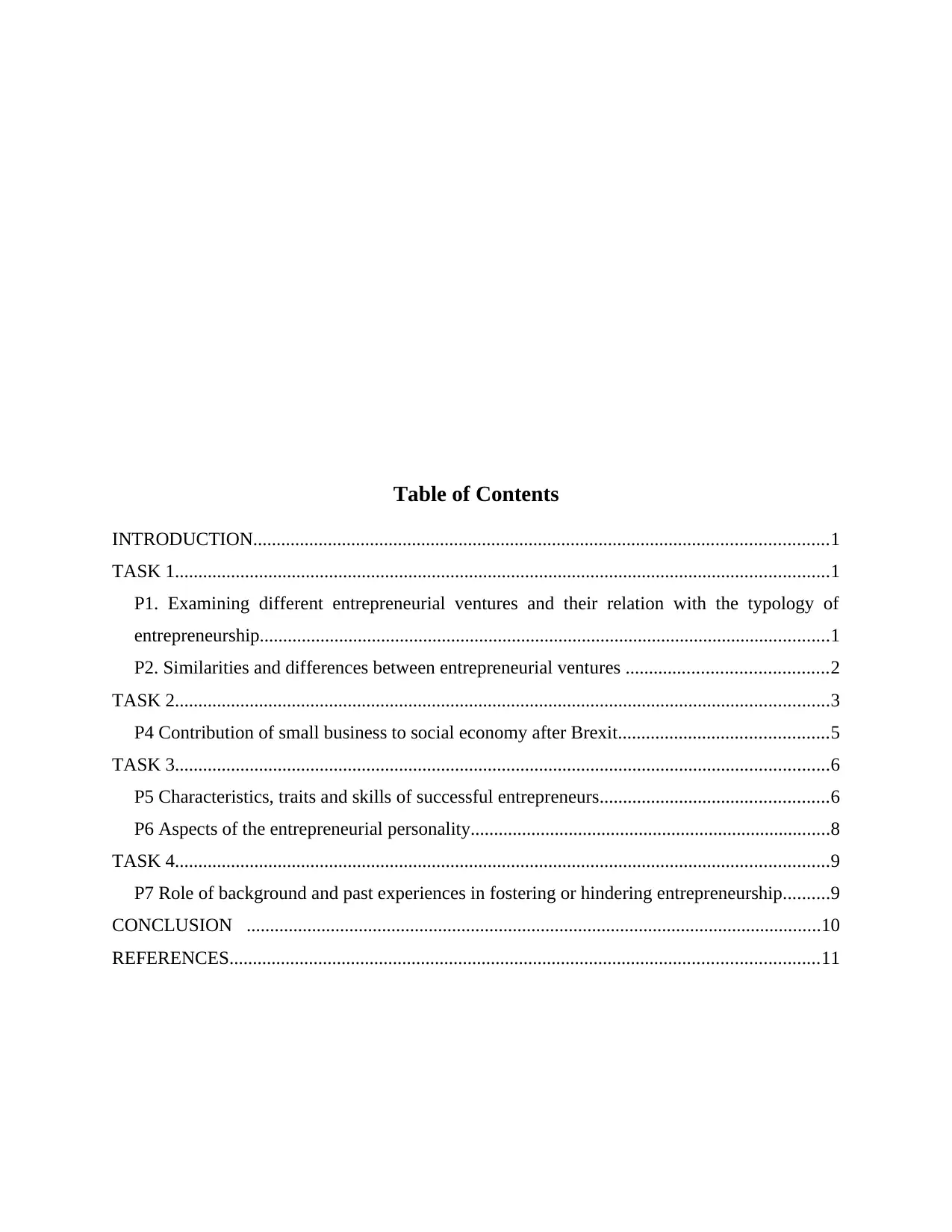
Table of Contents
INTRODUCTION...........................................................................................................................1
TASK 1............................................................................................................................................1
P1. Examining different entrepreneurial ventures and their relation with the typology of
entrepreneurship..........................................................................................................................1
P2. Similarities and differences between entrepreneurial ventures ...........................................2
TASK 2............................................................................................................................................3
P4 Contribution of small business to social economy after Brexit.............................................5
TASK 3............................................................................................................................................6
P5 Characteristics, traits and skills of successful entrepreneurs.................................................6
P6 Aspects of the entrepreneurial personality.............................................................................8
TASK 4............................................................................................................................................9
P7 Role of background and past experiences in fostering or hindering entrepreneurship..........9
CONCLUSION ...........................................................................................................................10
REFERENCES..............................................................................................................................11
INTRODUCTION...........................................................................................................................1
TASK 1............................................................................................................................................1
P1. Examining different entrepreneurial ventures and their relation with the typology of
entrepreneurship..........................................................................................................................1
P2. Similarities and differences between entrepreneurial ventures ...........................................2
TASK 2............................................................................................................................................3
P4 Contribution of small business to social economy after Brexit.............................................5
TASK 3............................................................................................................................................6
P5 Characteristics, traits and skills of successful entrepreneurs.................................................6
P6 Aspects of the entrepreneurial personality.............................................................................8
TASK 4............................................................................................................................................9
P7 Role of background and past experiences in fostering or hindering entrepreneurship..........9
CONCLUSION ...........................................................................................................................10
REFERENCES..............................................................................................................................11
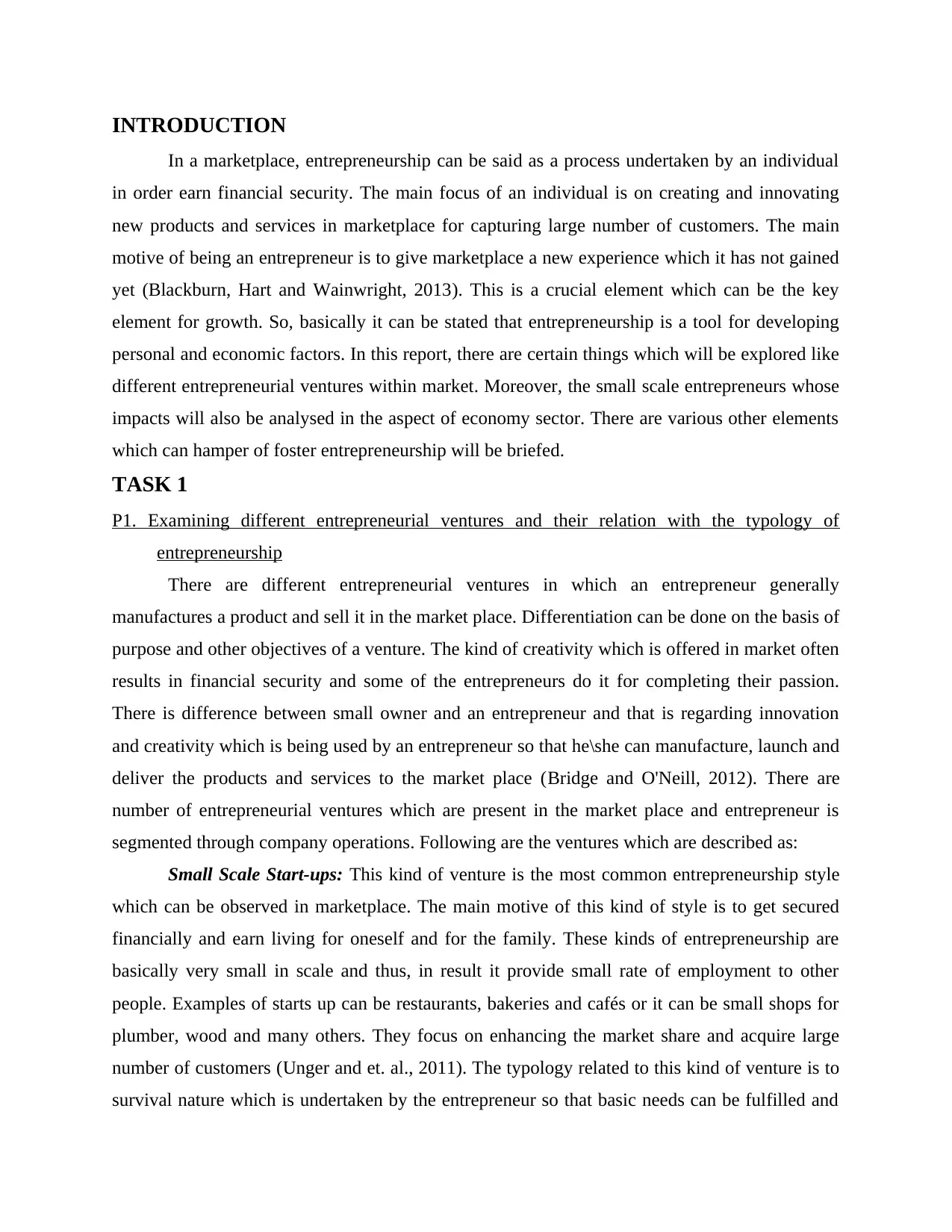
INTRODUCTION
In a marketplace, entrepreneurship can be said as a process undertaken by an individual
in order earn financial security. The main focus of an individual is on creating and innovating
new products and services in marketplace for capturing large number of customers. The main
motive of being an entrepreneur is to give marketplace a new experience which it has not gained
yet (Blackburn, Hart and Wainwright, 2013). This is a crucial element which can be the key
element for growth. So, basically it can be stated that entrepreneurship is a tool for developing
personal and economic factors. In this report, there are certain things which will be explored like
different entrepreneurial ventures within market. Moreover, the small scale entrepreneurs whose
impacts will also be analysed in the aspect of economy sector. There are various other elements
which can hamper of foster entrepreneurship will be briefed.
TASK 1
P1. Examining different entrepreneurial ventures and their relation with the typology of
entrepreneurship
There are different entrepreneurial ventures in which an entrepreneur generally
manufactures a product and sell it in the market place. Differentiation can be done on the basis of
purpose and other objectives of a venture. The kind of creativity which is offered in market often
results in financial security and some of the entrepreneurs do it for completing their passion.
There is difference between small owner and an entrepreneur and that is regarding innovation
and creativity which is being used by an entrepreneur so that he\she can manufacture, launch and
deliver the products and services to the market place (Bridge and O'Neill, 2012). There are
number of entrepreneurial ventures which are present in the market place and entrepreneur is
segmented through company operations. Following are the ventures which are described as:
Small Scale Start-ups: This kind of venture is the most common entrepreneurship style
which can be observed in marketplace. The main motive of this kind of style is to get secured
financially and earn living for oneself and for the family. These kinds of entrepreneurship are
basically very small in scale and thus, in result it provide small rate of employment to other
people. Examples of starts up can be restaurants, bakeries and cafés or it can be small shops for
plumber, wood and many others. They focus on enhancing the market share and acquire large
number of customers (Unger and et. al., 2011). The typology related to this kind of venture is to
survival nature which is undertaken by the entrepreneur so that basic needs can be fulfilled and
In a marketplace, entrepreneurship can be said as a process undertaken by an individual
in order earn financial security. The main focus of an individual is on creating and innovating
new products and services in marketplace for capturing large number of customers. The main
motive of being an entrepreneur is to give marketplace a new experience which it has not gained
yet (Blackburn, Hart and Wainwright, 2013). This is a crucial element which can be the key
element for growth. So, basically it can be stated that entrepreneurship is a tool for developing
personal and economic factors. In this report, there are certain things which will be explored like
different entrepreneurial ventures within market. Moreover, the small scale entrepreneurs whose
impacts will also be analysed in the aspect of economy sector. There are various other elements
which can hamper of foster entrepreneurship will be briefed.
TASK 1
P1. Examining different entrepreneurial ventures and their relation with the typology of
entrepreneurship
There are different entrepreneurial ventures in which an entrepreneur generally
manufactures a product and sell it in the market place. Differentiation can be done on the basis of
purpose and other objectives of a venture. The kind of creativity which is offered in market often
results in financial security and some of the entrepreneurs do it for completing their passion.
There is difference between small owner and an entrepreneur and that is regarding innovation
and creativity which is being used by an entrepreneur so that he\she can manufacture, launch and
deliver the products and services to the market place (Bridge and O'Neill, 2012). There are
number of entrepreneurial ventures which are present in the market place and entrepreneur is
segmented through company operations. Following are the ventures which are described as:
Small Scale Start-ups: This kind of venture is the most common entrepreneurship style
which can be observed in marketplace. The main motive of this kind of style is to get secured
financially and earn living for oneself and for the family. These kinds of entrepreneurship are
basically very small in scale and thus, in result it provide small rate of employment to other
people. Examples of starts up can be restaurants, bakeries and cafés or it can be small shops for
plumber, wood and many others. They focus on enhancing the market share and acquire large
number of customers (Unger and et. al., 2011). The typology related to this kind of venture is to
survival nature which is undertaken by the entrepreneur so that basic needs can be fulfilled and
⊘ This is a preview!⊘
Do you want full access?
Subscribe today to unlock all pages.

Trusted by 1+ million students worldwide
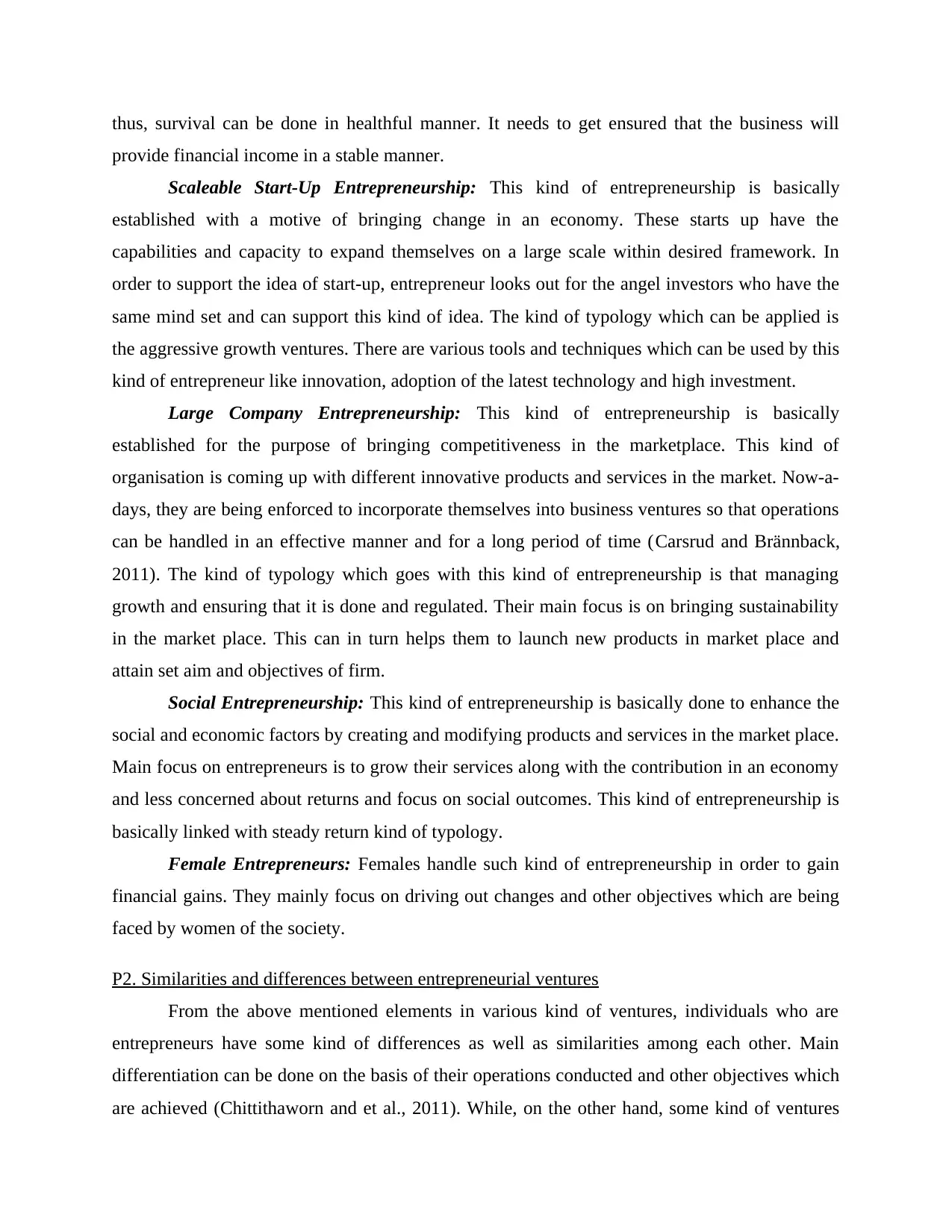
thus, survival can be done in healthful manner. It needs to get ensured that the business will
provide financial income in a stable manner.
Scaleable Start-Up Entrepreneurship: This kind of entrepreneurship is basically
established with a motive of bringing change in an economy. These starts up have the
capabilities and capacity to expand themselves on a large scale within desired framework. In
order to support the idea of start-up, entrepreneur looks out for the angel investors who have the
same mind set and can support this kind of idea. The kind of typology which can be applied is
the aggressive growth ventures. There are various tools and techniques which can be used by this
kind of entrepreneur like innovation, adoption of the latest technology and high investment.
Large Company Entrepreneurship: This kind of entrepreneurship is basically
established for the purpose of bringing competitiveness in the marketplace. This kind of
organisation is coming up with different innovative products and services in the market. Now-a-
days, they are being enforced to incorporate themselves into business ventures so that operations
can be handled in an effective manner and for a long period of time (Carsrud and Brännback,
2011). The kind of typology which goes with this kind of entrepreneurship is that managing
growth and ensuring that it is done and regulated. Their main focus is on bringing sustainability
in the market place. This can in turn helps them to launch new products in market place and
attain set aim and objectives of firm.
Social Entrepreneurship: This kind of entrepreneurship is basically done to enhance the
social and economic factors by creating and modifying products and services in the market place.
Main focus on entrepreneurs is to grow their services along with the contribution in an economy
and less concerned about returns and focus on social outcomes. This kind of entrepreneurship is
basically linked with steady return kind of typology.
Female Entrepreneurs: Females handle such kind of entrepreneurship in order to gain
financial gains. They mainly focus on driving out changes and other objectives which are being
faced by women of the society.
P2. Similarities and differences between entrepreneurial ventures
From the above mentioned elements in various kind of ventures, individuals who are
entrepreneurs have some kind of differences as well as similarities among each other. Main
differentiation can be done on the basis of their operations conducted and other objectives which
are achieved (Chittithaworn and et al., 2011). While, on the other hand, some kind of ventures
provide financial income in a stable manner.
Scaleable Start-Up Entrepreneurship: This kind of entrepreneurship is basically
established with a motive of bringing change in an economy. These starts up have the
capabilities and capacity to expand themselves on a large scale within desired framework. In
order to support the idea of start-up, entrepreneur looks out for the angel investors who have the
same mind set and can support this kind of idea. The kind of typology which can be applied is
the aggressive growth ventures. There are various tools and techniques which can be used by this
kind of entrepreneur like innovation, adoption of the latest technology and high investment.
Large Company Entrepreneurship: This kind of entrepreneurship is basically
established for the purpose of bringing competitiveness in the marketplace. This kind of
organisation is coming up with different innovative products and services in the market. Now-a-
days, they are being enforced to incorporate themselves into business ventures so that operations
can be handled in an effective manner and for a long period of time (Carsrud and Brännback,
2011). The kind of typology which goes with this kind of entrepreneurship is that managing
growth and ensuring that it is done and regulated. Their main focus is on bringing sustainability
in the market place. This can in turn helps them to launch new products in market place and
attain set aim and objectives of firm.
Social Entrepreneurship: This kind of entrepreneurship is basically done to enhance the
social and economic factors by creating and modifying products and services in the market place.
Main focus on entrepreneurs is to grow their services along with the contribution in an economy
and less concerned about returns and focus on social outcomes. This kind of entrepreneurship is
basically linked with steady return kind of typology.
Female Entrepreneurs: Females handle such kind of entrepreneurship in order to gain
financial gains. They mainly focus on driving out changes and other objectives which are being
faced by women of the society.
P2. Similarities and differences between entrepreneurial ventures
From the above mentioned elements in various kind of ventures, individuals who are
entrepreneurs have some kind of differences as well as similarities among each other. Main
differentiation can be done on the basis of their operations conducted and other objectives which
are achieved (Chittithaworn and et al., 2011). While, on the other hand, some kind of ventures
Paraphrase This Document
Need a fresh take? Get an instant paraphrase of this document with our AI Paraphraser
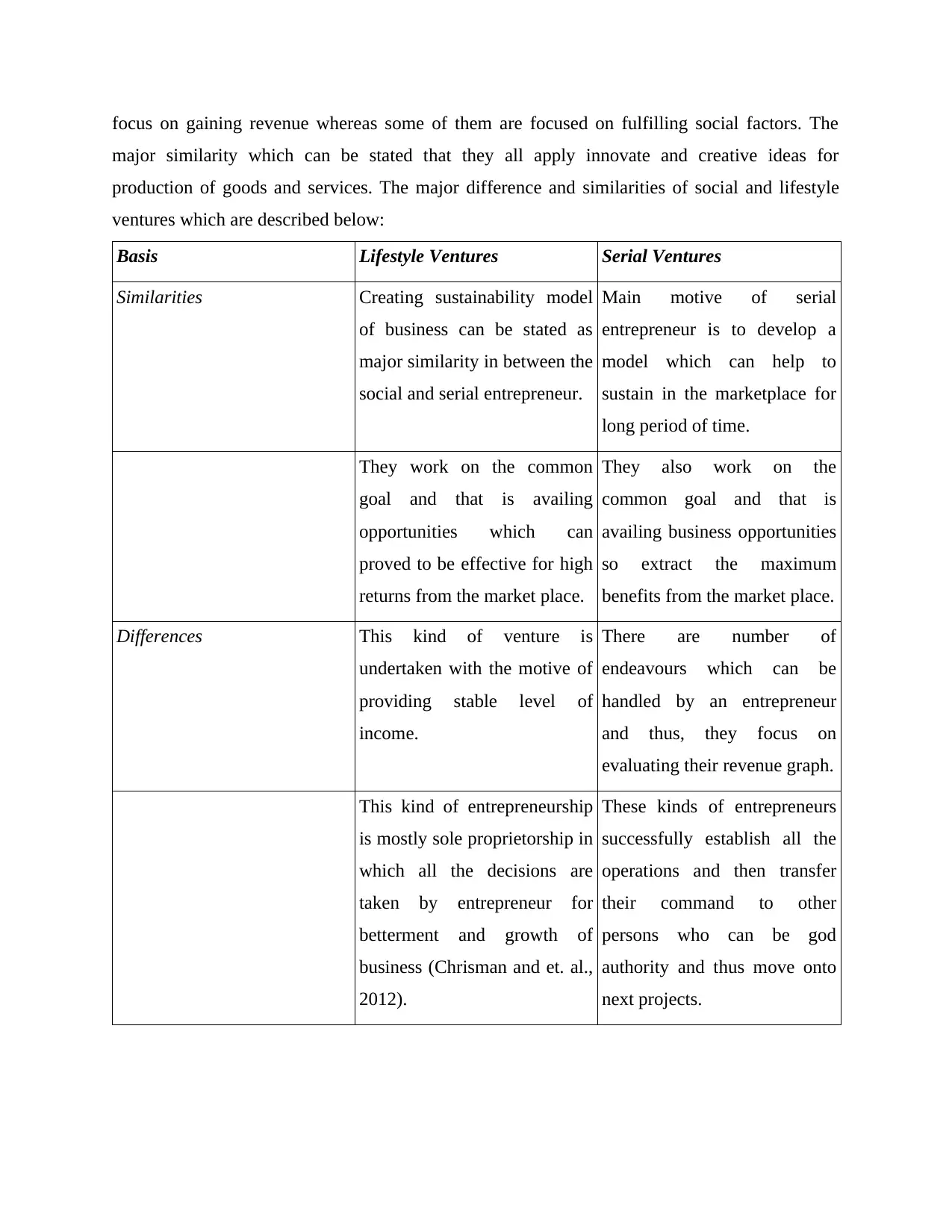
focus on gaining revenue whereas some of them are focused on fulfilling social factors. The
major similarity which can be stated that they all apply innovate and creative ideas for
production of goods and services. The major difference and similarities of social and lifestyle
ventures which are described below:
Basis Lifestyle Ventures Serial Ventures
Similarities Creating sustainability model
of business can be stated as
major similarity in between the
social and serial entrepreneur.
Main motive of serial
entrepreneur is to develop a
model which can help to
sustain in the marketplace for
long period of time.
They work on the common
goal and that is availing
opportunities which can
proved to be effective for high
returns from the market place.
They also work on the
common goal and that is
availing business opportunities
so extract the maximum
benefits from the market place.
Differences This kind of venture is
undertaken with the motive of
providing stable level of
income.
There are number of
endeavours which can be
handled by an entrepreneur
and thus, they focus on
evaluating their revenue graph.
This kind of entrepreneurship
is mostly sole proprietorship in
which all the decisions are
taken by entrepreneur for
betterment and growth of
business (Chrisman and et. al.,
2012).
These kinds of entrepreneurs
successfully establish all the
operations and then transfer
their command to other
persons who can be god
authority and thus move onto
next projects.
major similarity which can be stated that they all apply innovate and creative ideas for
production of goods and services. The major difference and similarities of social and lifestyle
ventures which are described below:
Basis Lifestyle Ventures Serial Ventures
Similarities Creating sustainability model
of business can be stated as
major similarity in between the
social and serial entrepreneur.
Main motive of serial
entrepreneur is to develop a
model which can help to
sustain in the marketplace for
long period of time.
They work on the common
goal and that is availing
opportunities which can
proved to be effective for high
returns from the market place.
They also work on the
common goal and that is
availing business opportunities
so extract the maximum
benefits from the market place.
Differences This kind of venture is
undertaken with the motive of
providing stable level of
income.
There are number of
endeavours which can be
handled by an entrepreneur
and thus, they focus on
evaluating their revenue graph.
This kind of entrepreneurship
is mostly sole proprietorship in
which all the decisions are
taken by entrepreneur for
betterment and growth of
business (Chrisman and et. al.,
2012).
These kinds of entrepreneurs
successfully establish all the
operations and then transfer
their command to other
persons who can be god
authority and thus move onto
next projects.
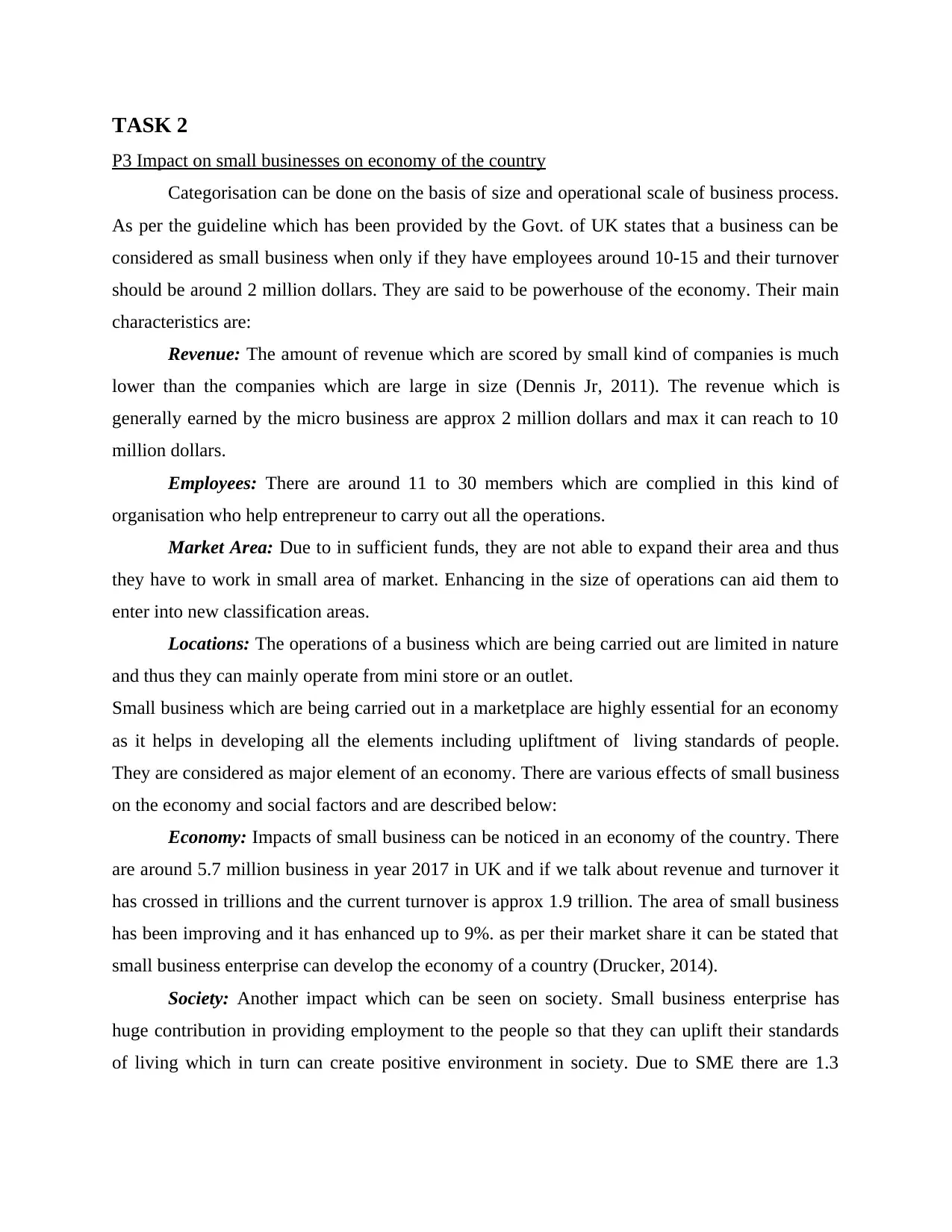
TASK 2
P3 Impact on small businesses on economy of the country
Categorisation can be done on the basis of size and operational scale of business process.
As per the guideline which has been provided by the Govt. of UK states that a business can be
considered as small business when only if they have employees around 10-15 and their turnover
should be around 2 million dollars. They are said to be powerhouse of the economy. Their main
characteristics are:
Revenue: The amount of revenue which are scored by small kind of companies is much
lower than the companies which are large in size (Dennis Jr, 2011). The revenue which is
generally earned by the micro business are approx 2 million dollars and max it can reach to 10
million dollars.
Employees: There are around 11 to 30 members which are complied in this kind of
organisation who help entrepreneur to carry out all the operations.
Market Area: Due to in sufficient funds, they are not able to expand their area and thus
they have to work in small area of market. Enhancing in the size of operations can aid them to
enter into new classification areas.
Locations: The operations of a business which are being carried out are limited in nature
and thus they can mainly operate from mini store or an outlet.
Small business which are being carried out in a marketplace are highly essential for an economy
as it helps in developing all the elements including upliftment of living standards of people.
They are considered as major element of an economy. There are various effects of small business
on the economy and social factors and are described below:
Economy: Impacts of small business can be noticed in an economy of the country. There
are around 5.7 million business in year 2017 in UK and if we talk about revenue and turnover it
has crossed in trillions and the current turnover is approx 1.9 trillion. The area of small business
has been improving and it has enhanced up to 9%. as per their market share it can be stated that
small business enterprise can develop the economy of a country (Drucker, 2014).
Society: Another impact which can be seen on society. Small business enterprise has
huge contribution in providing employment to the people so that they can uplift their standards
of living which in turn can create positive environment in society. Due to SME there are 1.3
P3 Impact on small businesses on economy of the country
Categorisation can be done on the basis of size and operational scale of business process.
As per the guideline which has been provided by the Govt. of UK states that a business can be
considered as small business when only if they have employees around 10-15 and their turnover
should be around 2 million dollars. They are said to be powerhouse of the economy. Their main
characteristics are:
Revenue: The amount of revenue which are scored by small kind of companies is much
lower than the companies which are large in size (Dennis Jr, 2011). The revenue which is
generally earned by the micro business are approx 2 million dollars and max it can reach to 10
million dollars.
Employees: There are around 11 to 30 members which are complied in this kind of
organisation who help entrepreneur to carry out all the operations.
Market Area: Due to in sufficient funds, they are not able to expand their area and thus
they have to work in small area of market. Enhancing in the size of operations can aid them to
enter into new classification areas.
Locations: The operations of a business which are being carried out are limited in nature
and thus they can mainly operate from mini store or an outlet.
Small business which are being carried out in a marketplace are highly essential for an economy
as it helps in developing all the elements including upliftment of living standards of people.
They are considered as major element of an economy. There are various effects of small business
on the economy and social factors and are described below:
Economy: Impacts of small business can be noticed in an economy of the country. There
are around 5.7 million business in year 2017 in UK and if we talk about revenue and turnover it
has crossed in trillions and the current turnover is approx 1.9 trillion. The area of small business
has been improving and it has enhanced up to 9%. as per their market share it can be stated that
small business enterprise can develop the economy of a country (Drucker, 2014).
Society: Another impact which can be seen on society. Small business enterprise has
huge contribution in providing employment to the people so that they can uplift their standards
of living which in turn can create positive environment in society. Due to SME there are 1.3
⊘ This is a preview!⊘
Do you want full access?
Subscribe today to unlock all pages.

Trusted by 1+ million students worldwide
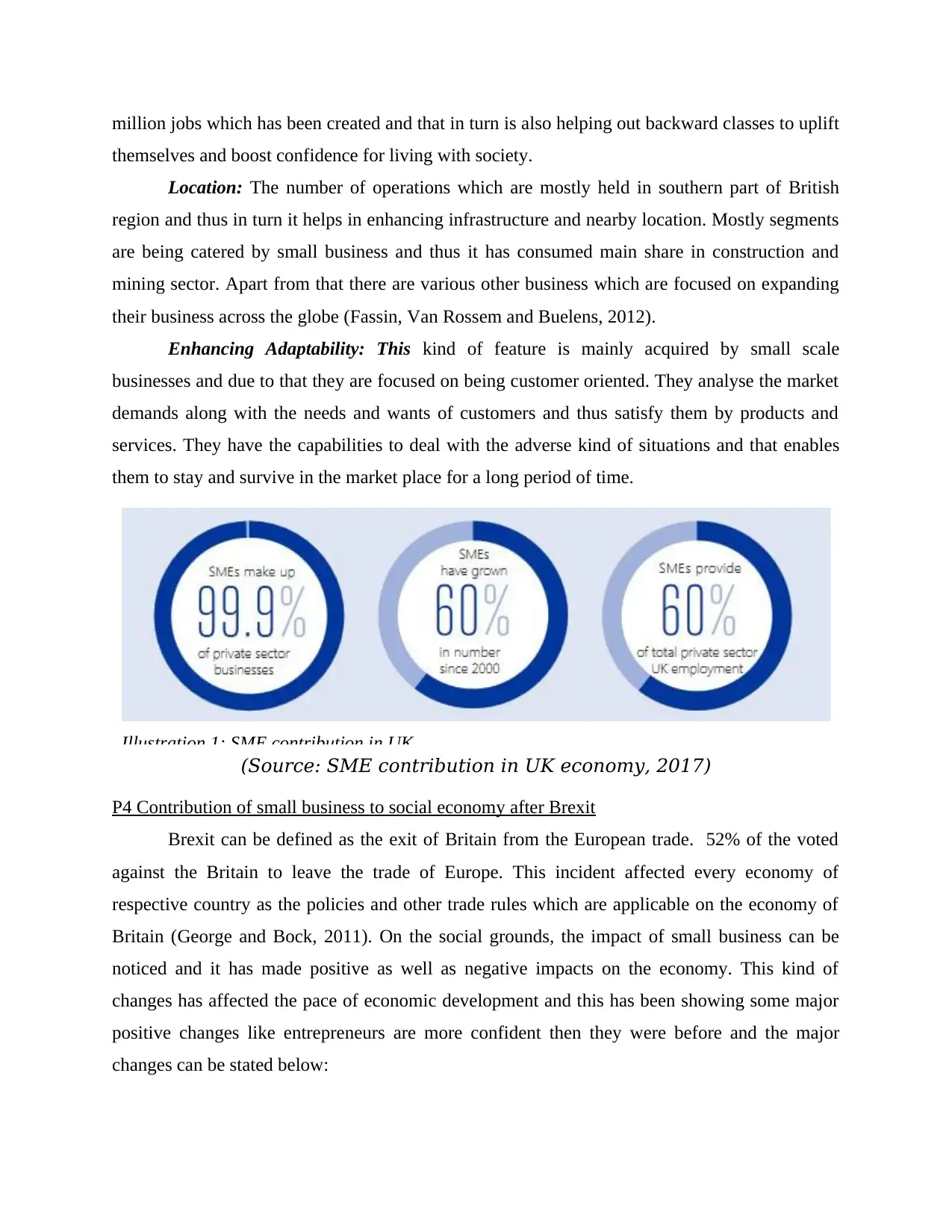
million jobs which has been created and that in turn is also helping out backward classes to uplift
themselves and boost confidence for living with society.
Location: The number of operations which are mostly held in southern part of British
region and thus in turn it helps in enhancing infrastructure and nearby location. Mostly segments
are being catered by small business and thus it has consumed main share in construction and
mining sector. Apart from that there are various other business which are focused on expanding
their business across the globe (Fassin, Van Rossem and Buelens, 2012).
Enhancing Adaptability: This kind of feature is mainly acquired by small scale
businesses and due to that they are focused on being customer oriented. They analyse the market
demands along with the needs and wants of customers and thus satisfy them by products and
services. They have the capabilities to deal with the adverse kind of situations and that enables
them to stay and survive in the market place for a long period of time.
Illustration 1: SME contribution in UK
(Source: SME contribution in UK economy, 2017)
P4 Contribution of small business to social economy after Brexit
Brexit can be defined as the exit of Britain from the European trade. 52% of the voted
against the Britain to leave the trade of Europe. This incident affected every economy of
respective country as the policies and other trade rules which are applicable on the economy of
Britain (George and Bock, 2011). On the social grounds, the impact of small business can be
noticed and it has made positive as well as negative impacts on the economy. This kind of
changes has affected the pace of economic development and this has been showing some major
positive changes like entrepreneurs are more confident then they were before and the major
changes can be stated below:
themselves and boost confidence for living with society.
Location: The number of operations which are mostly held in southern part of British
region and thus in turn it helps in enhancing infrastructure and nearby location. Mostly segments
are being catered by small business and thus it has consumed main share in construction and
mining sector. Apart from that there are various other business which are focused on expanding
their business across the globe (Fassin, Van Rossem and Buelens, 2012).
Enhancing Adaptability: This kind of feature is mainly acquired by small scale
businesses and due to that they are focused on being customer oriented. They analyse the market
demands along with the needs and wants of customers and thus satisfy them by products and
services. They have the capabilities to deal with the adverse kind of situations and that enables
them to stay and survive in the market place for a long period of time.
Illustration 1: SME contribution in UK
(Source: SME contribution in UK economy, 2017)
P4 Contribution of small business to social economy after Brexit
Brexit can be defined as the exit of Britain from the European trade. 52% of the voted
against the Britain to leave the trade of Europe. This incident affected every economy of
respective country as the policies and other trade rules which are applicable on the economy of
Britain (George and Bock, 2011). On the social grounds, the impact of small business can be
noticed and it has made positive as well as negative impacts on the economy. This kind of
changes has affected the pace of economic development and this has been showing some major
positive changes like entrepreneurs are more confident then they were before and the major
changes can be stated below:
Paraphrase This Document
Need a fresh take? Get an instant paraphrase of this document with our AI Paraphraser
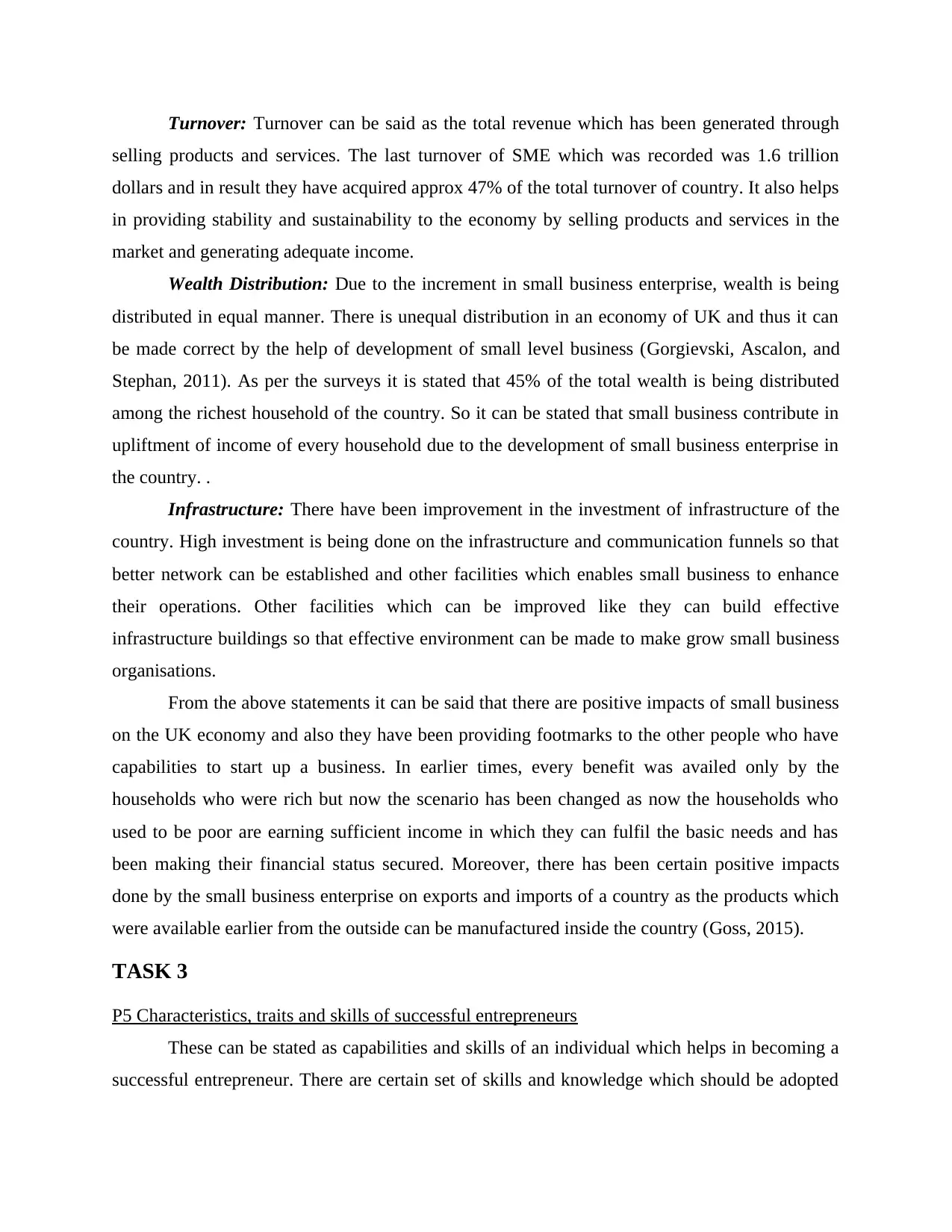
Turnover: Turnover can be said as the total revenue which has been generated through
selling products and services. The last turnover of SME which was recorded was 1.6 trillion
dollars and in result they have acquired approx 47% of the total turnover of country. It also helps
in providing stability and sustainability to the economy by selling products and services in the
market and generating adequate income.
Wealth Distribution: Due to the increment in small business enterprise, wealth is being
distributed in equal manner. There is unequal distribution in an economy of UK and thus it can
be made correct by the help of development of small level business (Gorgievski, Ascalon, and
Stephan, 2011). As per the surveys it is stated that 45% of the total wealth is being distributed
among the richest household of the country. So it can be stated that small business contribute in
upliftment of income of every household due to the development of small business enterprise in
the country. .
Infrastructure: There have been improvement in the investment of infrastructure of the
country. High investment is being done on the infrastructure and communication funnels so that
better network can be established and other facilities which enables small business to enhance
their operations. Other facilities which can be improved like they can build effective
infrastructure buildings so that effective environment can be made to make grow small business
organisations.
From the above statements it can be said that there are positive impacts of small business
on the UK economy and also they have been providing footmarks to the other people who have
capabilities to start up a business. In earlier times, every benefit was availed only by the
households who were rich but now the scenario has been changed as now the households who
used to be poor are earning sufficient income in which they can fulfil the basic needs and has
been making their financial status secured. Moreover, there has been certain positive impacts
done by the small business enterprise on exports and imports of a country as the products which
were available earlier from the outside can be manufactured inside the country (Goss, 2015).
TASK 3
P5 Characteristics, traits and skills of successful entrepreneurs
These can be stated as capabilities and skills of an individual which helps in becoming a
successful entrepreneur. There are certain set of skills and knowledge which should be adopted
selling products and services. The last turnover of SME which was recorded was 1.6 trillion
dollars and in result they have acquired approx 47% of the total turnover of country. It also helps
in providing stability and sustainability to the economy by selling products and services in the
market and generating adequate income.
Wealth Distribution: Due to the increment in small business enterprise, wealth is being
distributed in equal manner. There is unequal distribution in an economy of UK and thus it can
be made correct by the help of development of small level business (Gorgievski, Ascalon, and
Stephan, 2011). As per the surveys it is stated that 45% of the total wealth is being distributed
among the richest household of the country. So it can be stated that small business contribute in
upliftment of income of every household due to the development of small business enterprise in
the country. .
Infrastructure: There have been improvement in the investment of infrastructure of the
country. High investment is being done on the infrastructure and communication funnels so that
better network can be established and other facilities which enables small business to enhance
their operations. Other facilities which can be improved like they can build effective
infrastructure buildings so that effective environment can be made to make grow small business
organisations.
From the above statements it can be said that there are positive impacts of small business
on the UK economy and also they have been providing footmarks to the other people who have
capabilities to start up a business. In earlier times, every benefit was availed only by the
households who were rich but now the scenario has been changed as now the households who
used to be poor are earning sufficient income in which they can fulfil the basic needs and has
been making their financial status secured. Moreover, there has been certain positive impacts
done by the small business enterprise on exports and imports of a country as the products which
were available earlier from the outside can be manufactured inside the country (Goss, 2015).
TASK 3
P5 Characteristics, traits and skills of successful entrepreneurs
These can be stated as capabilities and skills of an individual which helps in becoming a
successful entrepreneur. There are certain set of skills and knowledge which should be adopted
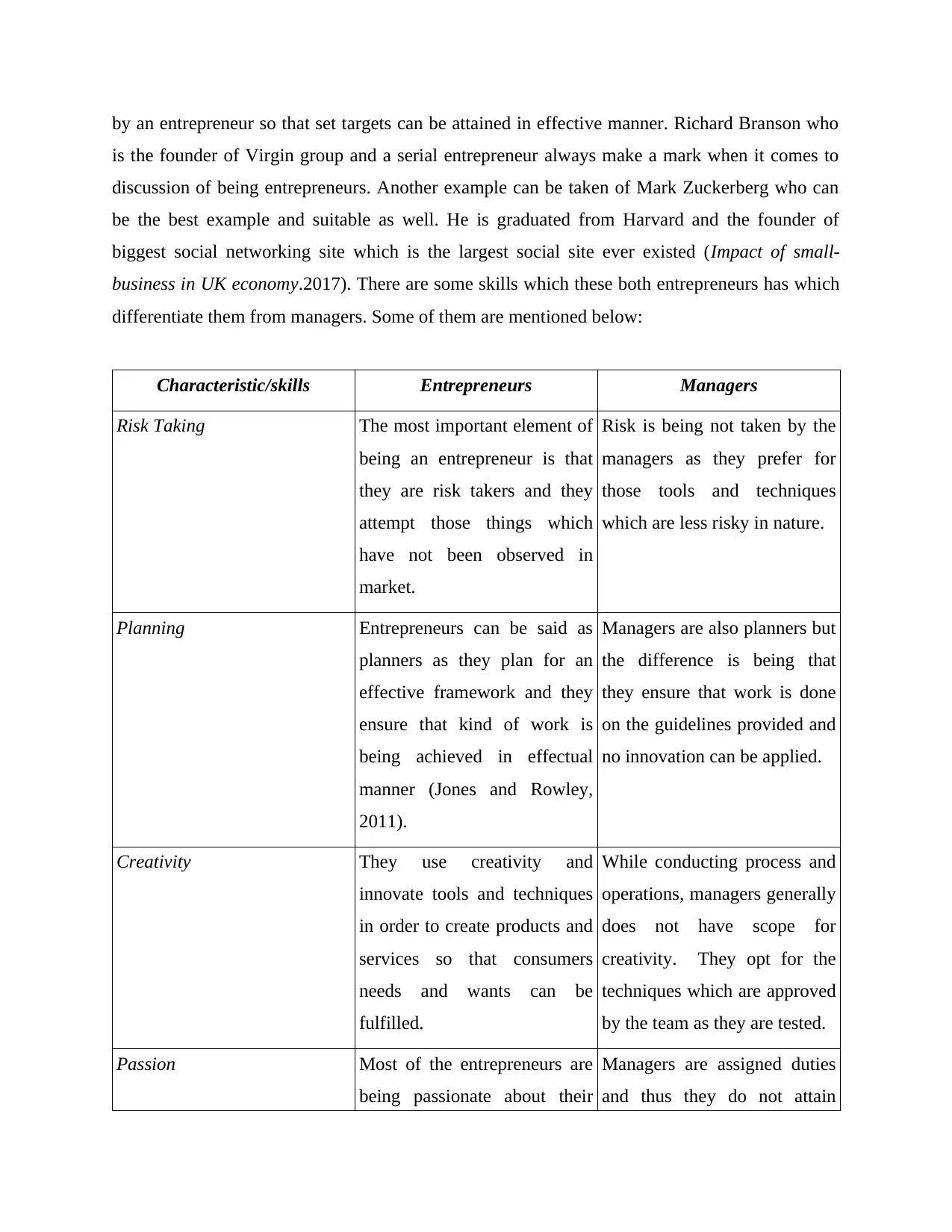
by an entrepreneur so that set targets can be attained in effective manner. Richard Branson who
is the founder of Virgin group and a serial entrepreneur always make a mark when it comes to
discussion of being entrepreneurs. Another example can be taken of Mark Zuckerberg who can
be the best example and suitable as well. He is graduated from Harvard and the founder of
biggest social networking site which is the largest social site ever existed (Impact of small-
business in UK economy.2017). There are some skills which these both entrepreneurs has which
differentiate them from managers. Some of them are mentioned below:
Characteristic/skills Entrepreneurs Managers
Risk Taking The most important element of
being an entrepreneur is that
they are risk takers and they
attempt those things which
have not been observed in
market.
Risk is being not taken by the
managers as they prefer for
those tools and techniques
which are less risky in nature.
Planning Entrepreneurs can be said as
planners as they plan for an
effective framework and they
ensure that kind of work is
being achieved in effectual
manner (Jones and Rowley,
2011).
Managers are also planners but
the difference is being that
they ensure that work is done
on the guidelines provided and
no innovation can be applied.
Creativity They use creativity and
innovate tools and techniques
in order to create products and
services so that consumers
needs and wants can be
fulfilled.
While conducting process and
operations, managers generally
does not have scope for
creativity. They opt for the
techniques which are approved
by the team as they are tested.
Passion Most of the entrepreneurs are
being passionate about their
Managers are assigned duties
and thus they do not attain
is the founder of Virgin group and a serial entrepreneur always make a mark when it comes to
discussion of being entrepreneurs. Another example can be taken of Mark Zuckerberg who can
be the best example and suitable as well. He is graduated from Harvard and the founder of
biggest social networking site which is the largest social site ever existed (Impact of small-
business in UK economy.2017). There are some skills which these both entrepreneurs has which
differentiate them from managers. Some of them are mentioned below:
Characteristic/skills Entrepreneurs Managers
Risk Taking The most important element of
being an entrepreneur is that
they are risk takers and they
attempt those things which
have not been observed in
market.
Risk is being not taken by the
managers as they prefer for
those tools and techniques
which are less risky in nature.
Planning Entrepreneurs can be said as
planners as they plan for an
effective framework and they
ensure that kind of work is
being achieved in effectual
manner (Jones and Rowley,
2011).
Managers are also planners but
the difference is being that
they ensure that work is done
on the guidelines provided and
no innovation can be applied.
Creativity They use creativity and
innovate tools and techniques
in order to create products and
services so that consumers
needs and wants can be
fulfilled.
While conducting process and
operations, managers generally
does not have scope for
creativity. They opt for the
techniques which are approved
by the team as they are tested.
Passion Most of the entrepreneurs are
being passionate about their
Managers are assigned duties
and thus they do not attain
⊘ This is a preview!⊘
Do you want full access?
Subscribe today to unlock all pages.

Trusted by 1+ million students worldwide
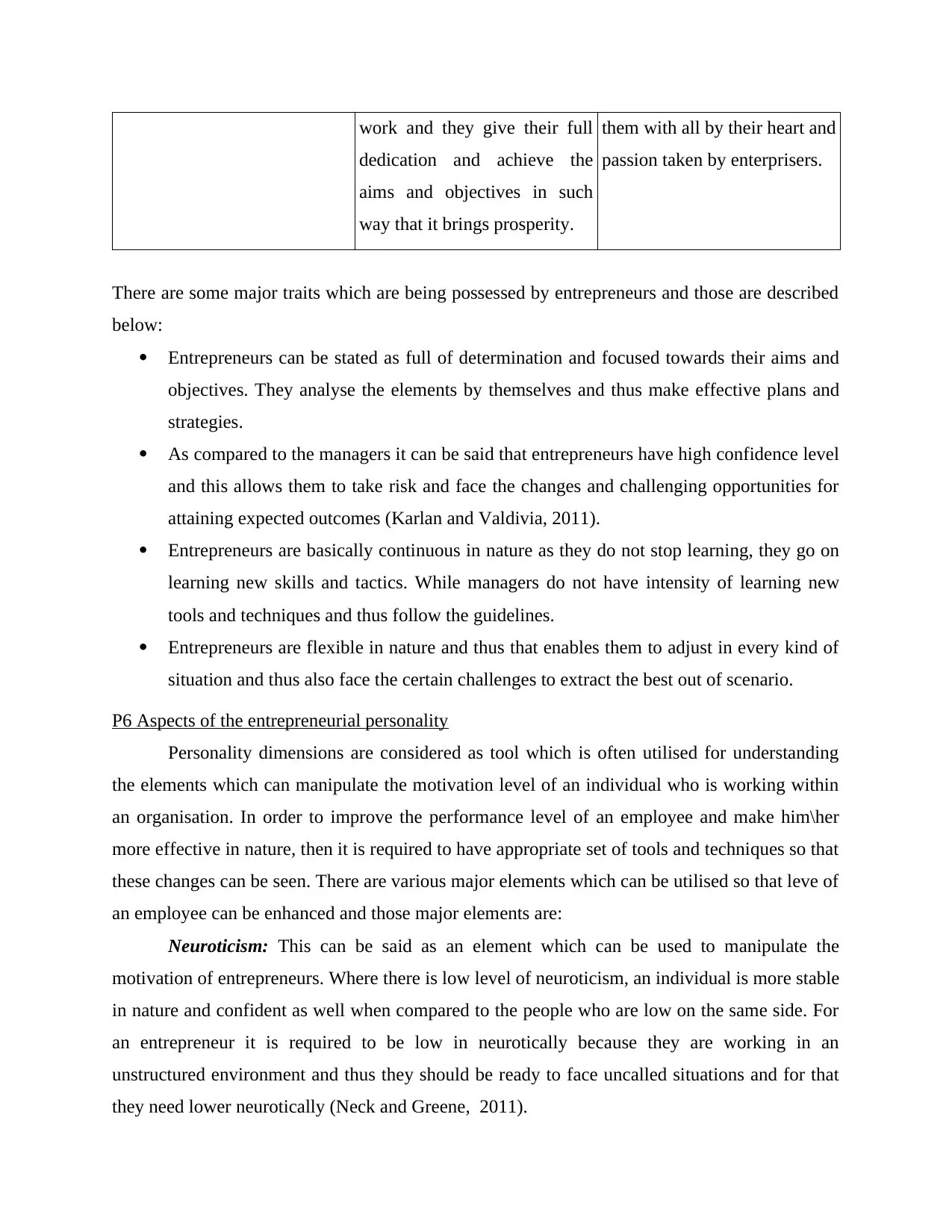
work and they give their full
dedication and achieve the
aims and objectives in such
way that it brings prosperity.
them with all by their heart and
passion taken by enterprisers.
There are some major traits which are being possessed by entrepreneurs and those are described
below:
Entrepreneurs can be stated as full of determination and focused towards their aims and
objectives. They analyse the elements by themselves and thus make effective plans and
strategies.
As compared to the managers it can be said that entrepreneurs have high confidence level
and this allows them to take risk and face the changes and challenging opportunities for
attaining expected outcomes (Karlan and Valdivia, 2011).
Entrepreneurs are basically continuous in nature as they do not stop learning, they go on
learning new skills and tactics. While managers do not have intensity of learning new
tools and techniques and thus follow the guidelines.
Entrepreneurs are flexible in nature and thus that enables them to adjust in every kind of
situation and thus also face the certain challenges to extract the best out of scenario.
P6 Aspects of the entrepreneurial personality
Personality dimensions are considered as tool which is often utilised for understanding
the elements which can manipulate the motivation level of an individual who is working within
an organisation. In order to improve the performance level of an employee and make him\her
more effective in nature, then it is required to have appropriate set of tools and techniques so that
these changes can be seen. There are various major elements which can be utilised so that leve of
an employee can be enhanced and those major elements are:
Neuroticism: This can be said as an element which can be used to manipulate the
motivation of entrepreneurs. Where there is low level of neuroticism, an individual is more stable
in nature and confident as well when compared to the people who are low on the same side. For
an entrepreneur it is required to be low in neurotically because they are working in an
unstructured environment and thus they should be ready to face uncalled situations and for that
they need lower neurotically (Neck and Greene, 2011).
dedication and achieve the
aims and objectives in such
way that it brings prosperity.
them with all by their heart and
passion taken by enterprisers.
There are some major traits which are being possessed by entrepreneurs and those are described
below:
Entrepreneurs can be stated as full of determination and focused towards their aims and
objectives. They analyse the elements by themselves and thus make effective plans and
strategies.
As compared to the managers it can be said that entrepreneurs have high confidence level
and this allows them to take risk and face the changes and challenging opportunities for
attaining expected outcomes (Karlan and Valdivia, 2011).
Entrepreneurs are basically continuous in nature as they do not stop learning, they go on
learning new skills and tactics. While managers do not have intensity of learning new
tools and techniques and thus follow the guidelines.
Entrepreneurs are flexible in nature and thus that enables them to adjust in every kind of
situation and thus also face the certain challenges to extract the best out of scenario.
P6 Aspects of the entrepreneurial personality
Personality dimensions are considered as tool which is often utilised for understanding
the elements which can manipulate the motivation level of an individual who is working within
an organisation. In order to improve the performance level of an employee and make him\her
more effective in nature, then it is required to have appropriate set of tools and techniques so that
these changes can be seen. There are various major elements which can be utilised so that leve of
an employee can be enhanced and those major elements are:
Neuroticism: This can be said as an element which can be used to manipulate the
motivation of entrepreneurs. Where there is low level of neuroticism, an individual is more stable
in nature and confident as well when compared to the people who are low on the same side. For
an entrepreneur it is required to be low in neurotically because they are working in an
unstructured environment and thus they should be ready to face uncalled situations and for that
they need lower neurotically (Neck and Greene, 2011).
Paraphrase This Document
Need a fresh take? Get an instant paraphrase of this document with our AI Paraphraser
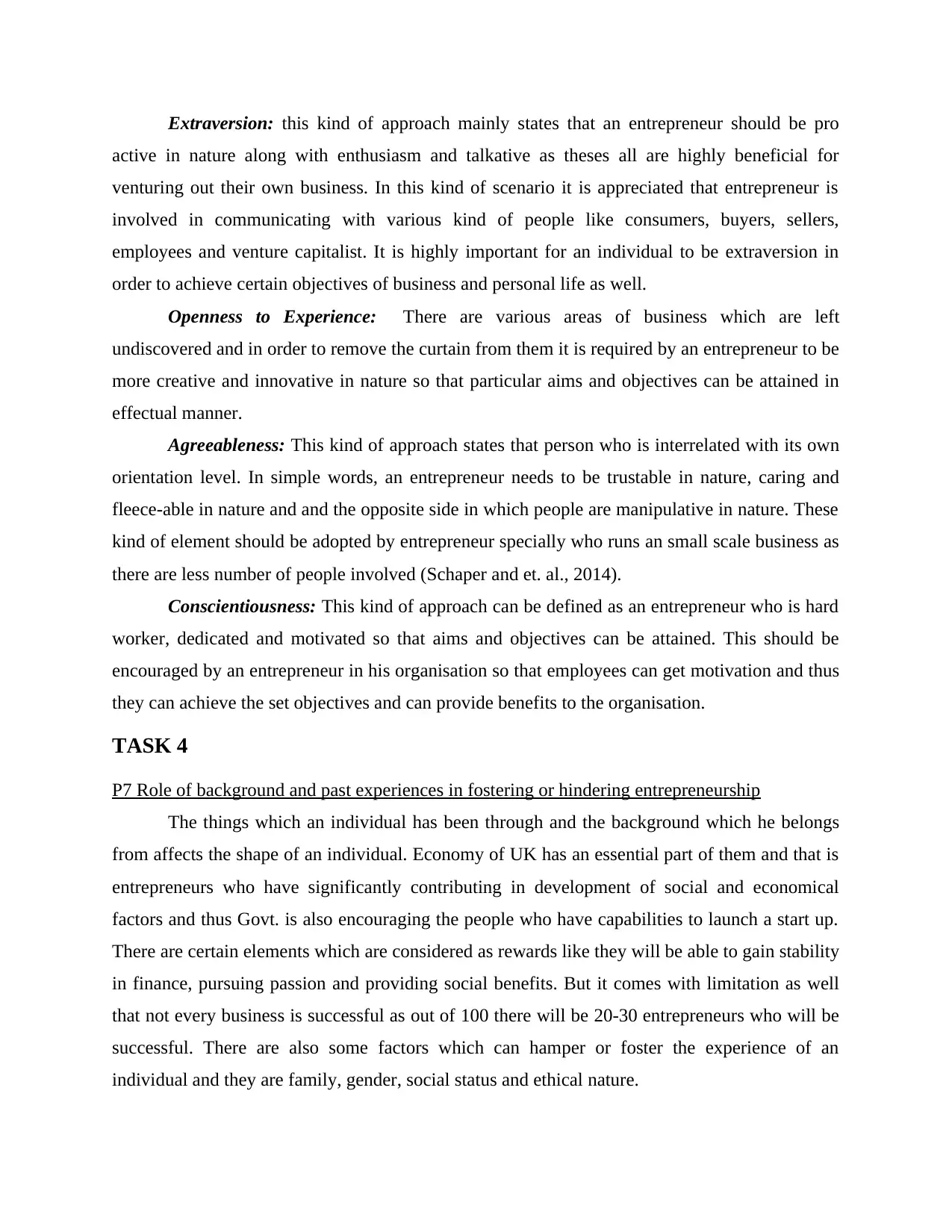
Extraversion: this kind of approach mainly states that an entrepreneur should be pro
active in nature along with enthusiasm and talkative as theses all are highly beneficial for
venturing out their own business. In this kind of scenario it is appreciated that entrepreneur is
involved in communicating with various kind of people like consumers, buyers, sellers,
employees and venture capitalist. It is highly important for an individual to be extraversion in
order to achieve certain objectives of business and personal life as well.
Openness to Experience: There are various areas of business which are left
undiscovered and in order to remove the curtain from them it is required by an entrepreneur to be
more creative and innovative in nature so that particular aims and objectives can be attained in
effectual manner.
Agreeableness: This kind of approach states that person who is interrelated with its own
orientation level. In simple words, an entrepreneur needs to be trustable in nature, caring and
fleece-able in nature and and the opposite side in which people are manipulative in nature. These
kind of element should be adopted by entrepreneur specially who runs an small scale business as
there are less number of people involved (Schaper and et. al., 2014).
Conscientiousness: This kind of approach can be defined as an entrepreneur who is hard
worker, dedicated and motivated so that aims and objectives can be attained. This should be
encouraged by an entrepreneur in his organisation so that employees can get motivation and thus
they can achieve the set objectives and can provide benefits to the organisation.
TASK 4
P7 Role of background and past experiences in fostering or hindering entrepreneurship
The things which an individual has been through and the background which he belongs
from affects the shape of an individual. Economy of UK has an essential part of them and that is
entrepreneurs who have significantly contributing in development of social and economical
factors and thus Govt. is also encouraging the people who have capabilities to launch a start up.
There are certain elements which are considered as rewards like they will be able to gain stability
in finance, pursuing passion and providing social benefits. But it comes with limitation as well
that not every business is successful as out of 100 there will be 20-30 entrepreneurs who will be
successful. There are also some factors which can hamper or foster the experience of an
individual and they are family, gender, social status and ethical nature.
active in nature along with enthusiasm and talkative as theses all are highly beneficial for
venturing out their own business. In this kind of scenario it is appreciated that entrepreneur is
involved in communicating with various kind of people like consumers, buyers, sellers,
employees and venture capitalist. It is highly important for an individual to be extraversion in
order to achieve certain objectives of business and personal life as well.
Openness to Experience: There are various areas of business which are left
undiscovered and in order to remove the curtain from them it is required by an entrepreneur to be
more creative and innovative in nature so that particular aims and objectives can be attained in
effectual manner.
Agreeableness: This kind of approach states that person who is interrelated with its own
orientation level. In simple words, an entrepreneur needs to be trustable in nature, caring and
fleece-able in nature and and the opposite side in which people are manipulative in nature. These
kind of element should be adopted by entrepreneur specially who runs an small scale business as
there are less number of people involved (Schaper and et. al., 2014).
Conscientiousness: This kind of approach can be defined as an entrepreneur who is hard
worker, dedicated and motivated so that aims and objectives can be attained. This should be
encouraged by an entrepreneur in his organisation so that employees can get motivation and thus
they can achieve the set objectives and can provide benefits to the organisation.
TASK 4
P7 Role of background and past experiences in fostering or hindering entrepreneurship
The things which an individual has been through and the background which he belongs
from affects the shape of an individual. Economy of UK has an essential part of them and that is
entrepreneurs who have significantly contributing in development of social and economical
factors and thus Govt. is also encouraging the people who have capabilities to launch a start up.
There are certain elements which are considered as rewards like they will be able to gain stability
in finance, pursuing passion and providing social benefits. But it comes with limitation as well
that not every business is successful as out of 100 there will be 20-30 entrepreneurs who will be
successful. There are also some factors which can hamper or foster the experience of an
individual and they are family, gender, social status and ethical nature.
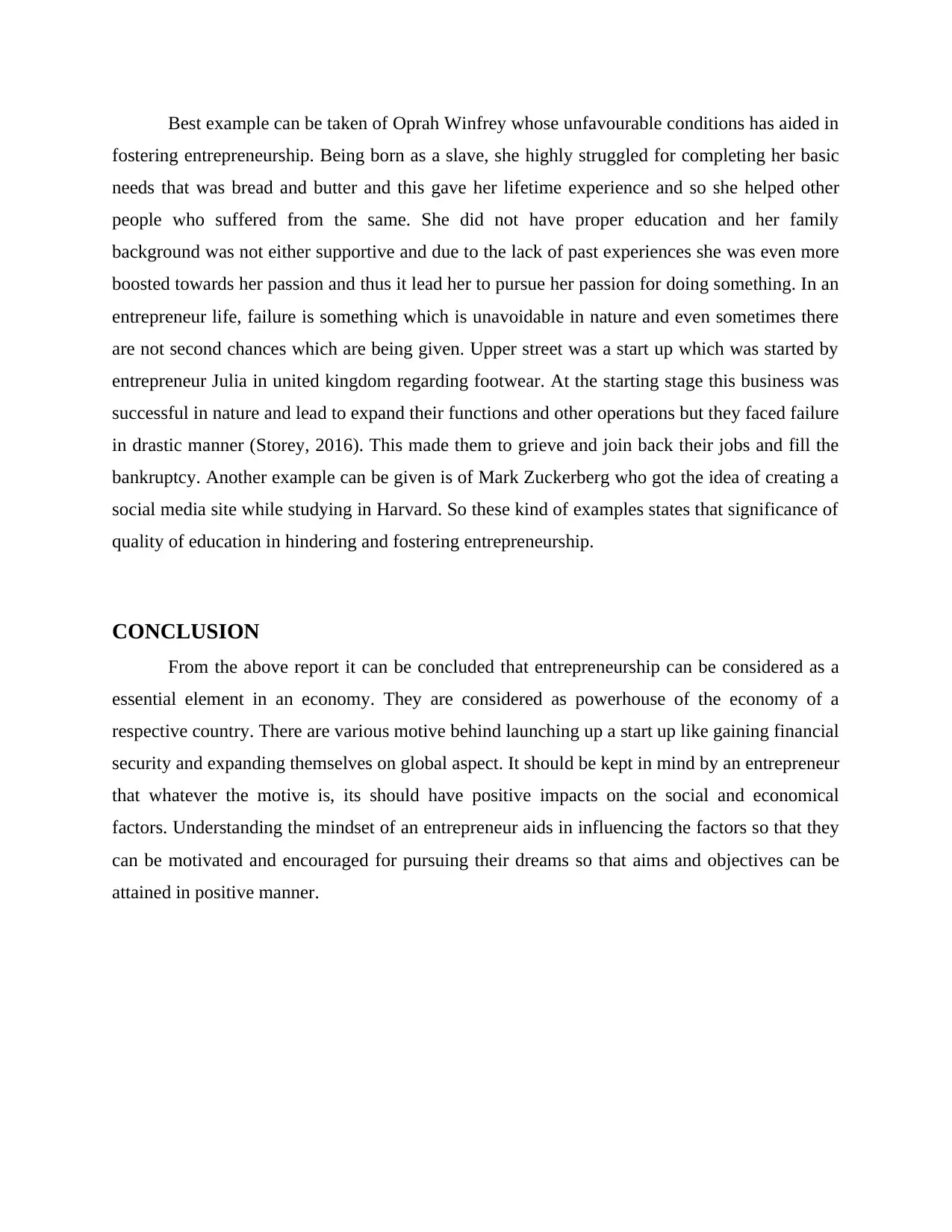
Best example can be taken of Oprah Winfrey whose unfavourable conditions has aided in
fostering entrepreneurship. Being born as a slave, she highly struggled for completing her basic
needs that was bread and butter and this gave her lifetime experience and so she helped other
people who suffered from the same. She did not have proper education and her family
background was not either supportive and due to the lack of past experiences she was even more
boosted towards her passion and thus it lead her to pursue her passion for doing something. In an
entrepreneur life, failure is something which is unavoidable in nature and even sometimes there
are not second chances which are being given. Upper street was a start up which was started by
entrepreneur Julia in united kingdom regarding footwear. At the starting stage this business was
successful in nature and lead to expand their functions and other operations but they faced failure
in drastic manner (Storey, 2016). This made them to grieve and join back their jobs and fill the
bankruptcy. Another example can be given is of Mark Zuckerberg who got the idea of creating a
social media site while studying in Harvard. So these kind of examples states that significance of
quality of education in hindering and fostering entrepreneurship.
CONCLUSION
From the above report it can be concluded that entrepreneurship can be considered as a
essential element in an economy. They are considered as powerhouse of the economy of a
respective country. There are various motive behind launching up a start up like gaining financial
security and expanding themselves on global aspect. It should be kept in mind by an entrepreneur
that whatever the motive is, its should have positive impacts on the social and economical
factors. Understanding the mindset of an entrepreneur aids in influencing the factors so that they
can be motivated and encouraged for pursuing their dreams so that aims and objectives can be
attained in positive manner.
fostering entrepreneurship. Being born as a slave, she highly struggled for completing her basic
needs that was bread and butter and this gave her lifetime experience and so she helped other
people who suffered from the same. She did not have proper education and her family
background was not either supportive and due to the lack of past experiences she was even more
boosted towards her passion and thus it lead her to pursue her passion for doing something. In an
entrepreneur life, failure is something which is unavoidable in nature and even sometimes there
are not second chances which are being given. Upper street was a start up which was started by
entrepreneur Julia in united kingdom regarding footwear. At the starting stage this business was
successful in nature and lead to expand their functions and other operations but they faced failure
in drastic manner (Storey, 2016). This made them to grieve and join back their jobs and fill the
bankruptcy. Another example can be given is of Mark Zuckerberg who got the idea of creating a
social media site while studying in Harvard. So these kind of examples states that significance of
quality of education in hindering and fostering entrepreneurship.
CONCLUSION
From the above report it can be concluded that entrepreneurship can be considered as a
essential element in an economy. They are considered as powerhouse of the economy of a
respective country. There are various motive behind launching up a start up like gaining financial
security and expanding themselves on global aspect. It should be kept in mind by an entrepreneur
that whatever the motive is, its should have positive impacts on the social and economical
factors. Understanding the mindset of an entrepreneur aids in influencing the factors so that they
can be motivated and encouraged for pursuing their dreams so that aims and objectives can be
attained in positive manner.
⊘ This is a preview!⊘
Do you want full access?
Subscribe today to unlock all pages.

Trusted by 1+ million students worldwide
1 out of 13
Related Documents
Your All-in-One AI-Powered Toolkit for Academic Success.
+13062052269
info@desklib.com
Available 24*7 on WhatsApp / Email
![[object Object]](/_next/static/media/star-bottom.7253800d.svg)
Unlock your academic potential
Copyright © 2020–2026 A2Z Services. All Rights Reserved. Developed and managed by ZUCOL.





